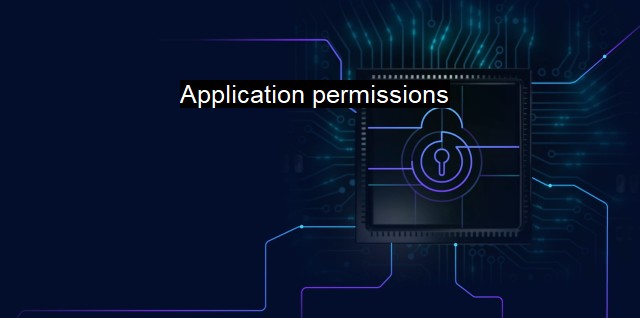What are Application permissions?
Securing Your System: Understanding Application Permissions in Cybersecurity and Antivirus
"Application permissions" is a concept in the realm of computer systems that refers to the rights or privileges accorded to certain software applications and digital systems. The purpose of application permissions is to regulate and control access to critical system resources and user data for safety and functional efficacy reasons. This plays an important role in cybersecurity and antivirus infrastructure since it acts as a first line of defense against malicious software attacks and inadvertent data breaches.Imagine that one's computer or digital device is a secure and private home and the software applications are the residents or guests accessing various rooms. Just as guests should have only limited access to different rooms, depending on their relationship to the homeowner, the software applications should also be able to only access the system resources they necessitate to function, thereby, ensuring user data protection. This is what application permissions accomplish, they narrowly define what a program can and cannot do.
In a typical operating system, there exist various levels of application permissions. Permissions include the ability to read, write, modify, or delete data. They can extend to system-wide actions such as initiating external communication, accessing hardware devices, or otherwise interacting with system settings or other applications. An editing software, for instance, needs read-write access to open and modify files, while a music player requires read-only access to play songs. Giving a software more permissions than it needs could place one's system at unnecessary risk- a concept in cybersecurity known as "privilege creep."
Permissions are often tied to user accounts to ensure that users can only perform actions compatible with their roles, and do not typically change once assigned. But when it is about the dynamic environments of the mobile operating systems where apps are continuously downloaded, these permissions can change more frequently. This permission concept is highly visible in mobile operating systems, where every app installation requires the user's consent to the required permissions.
The principle of least privilege (PoLP) is highly relevant. It states that a user or application should have the smallest amount of access-permissions that they need to perform their function and nothing more than that. PoLP can significantly reduce the risk of malware spread or data breaches.
For antivirus programs, application permissions are critical. Antivirus software typically requires a broad array of permissions in order to function effectively. These include the abilities to scan systems for known malware signatures, monitor all system and user actions, block suspected malicious activities, and quarantine or delete infected files. Because of their extensive requirements, antivirus software often runs with administrator or high-level privileges, requiring user authorization and system-level trust.
One could think granting such high access levels to antivirus might expose one to risk, but it is carefully engineered that antivirus software is trustworthy and also heavily firewalled, so that no external, untrusted entity can gain control of it. Despite these protective measures, users must remain vigilant about which applications they give permissions to and limit the number of applications with extensive privileges because the potential damage such an app can do if it gets compromised is higher.
To sum up, application permissions play a key role in the overall management of system security, regulating access to critical features and datasets as well as safeguarding user information from malicious attacks. Understanding and managing them is crucial to forming layers of defenses in cyberspace. Even with the best antivirus software, if application permissions aren't regulated correctly, one could still be adding unnecessary risk. Thus, being observant and vigilant about imparting permissions is paramount for both individuals and organizations.

Application permissions FAQs
What are application permissions?
Application permissions are the settings in your device or computer that determine what specific actions or data a particular application can access. This includes things like camera, microphone, contacts, location, and other sensitive information.Why are application permissions important for cybersecurity?
Application permissions are important for keeping your device or computer secure and protecting your personal information. If an application has access to sensitive data that it doesn't need, it could potentially be used to steal your information or compromise your device.How can I manage application permissions on my device or computer?
The process for managing application permissions varies depending on your device or operating system. However, most devices and operating systems have a section in settings for managing app permissions. You can review which apps have access to specific information or features, and change those permissions as needed.Can antivirus software help with application permissions?
Yes, antivirus software can help keep your device secure by monitoring which applications have access to sensitive information and alerting you if an app is behaving suspiciously. Some antivirus software includes features for managing app permissions, such as blocking apps from accessing certain data or disabling permissions for apps that you're not using.| | A | | | B | | | C | | | D | | | E | | | F | | | G | | | H | | | I | | | J | | | K | | | L | | | M | |
| | N | | | O | | | P | | | Q | | | R | | | S | | | T | | | U | | | V | | | W | | | X | | | Y | | | Z | |
| | 1 | | | 2 | | | 3 | | | 4 | | | 7 | | | 8 | | |||||||